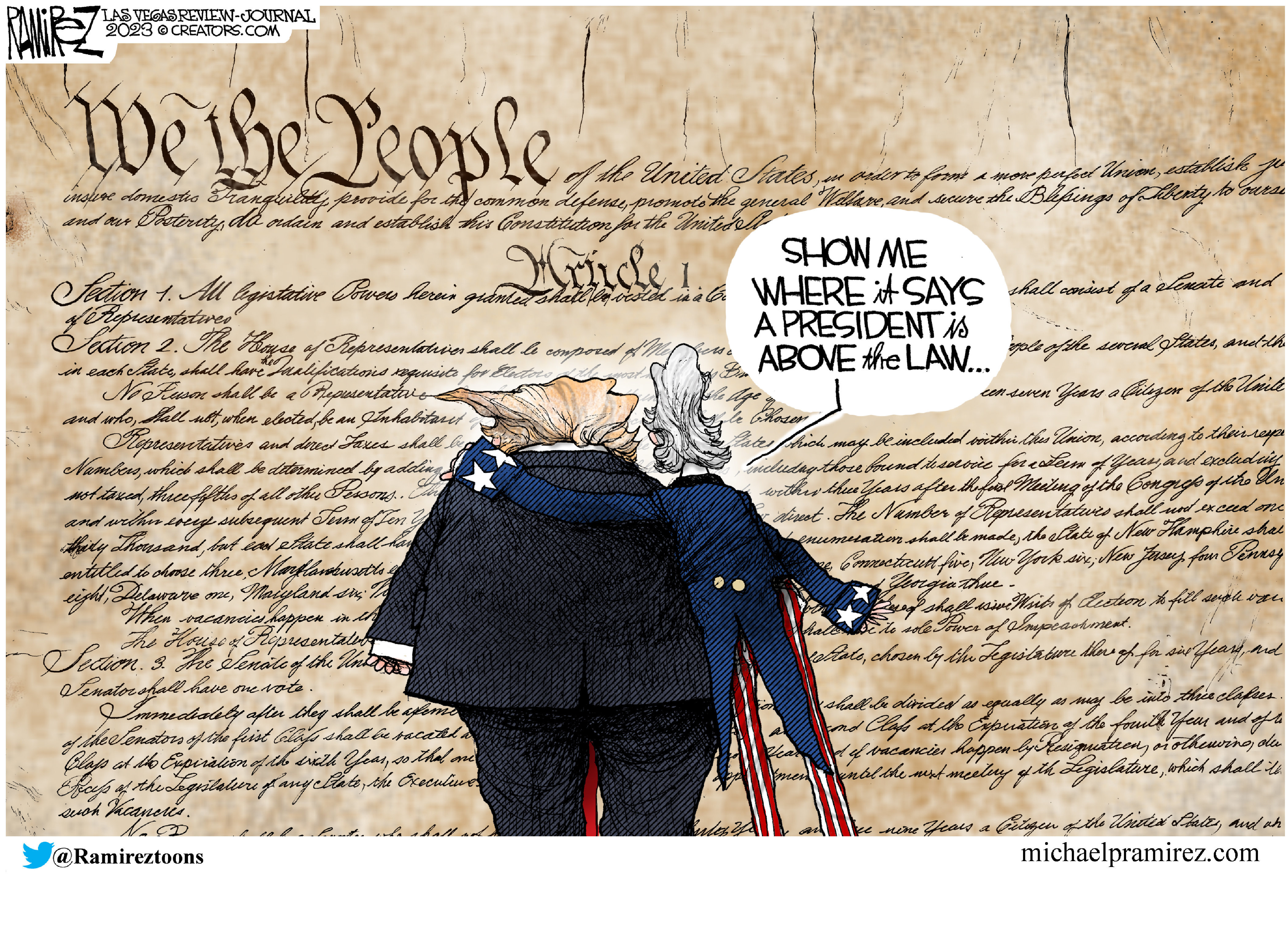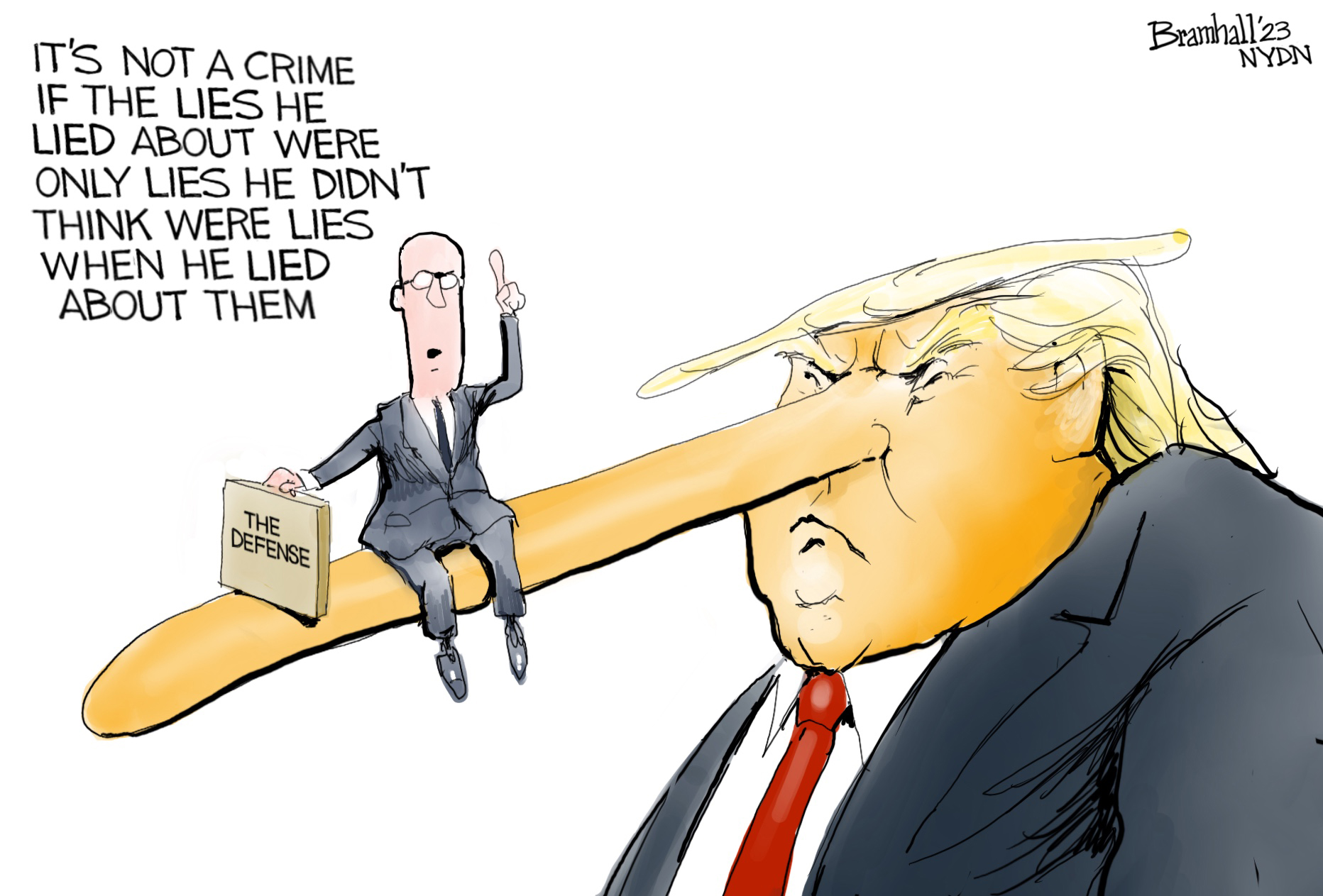
Trump and his followers have said a lot about his indictments.
But their arguments have little to do with whether he’s guilty.
Since his legal troubles started, Donald Trump, his lawyers, and various conservative commentators who repeat his talking points have commented at length on his various indictments. But very few of those comments present arguments his lawyers could credibly present in court. Instead, most of what you’ll hear on Fox News are arguments intended either to move public opinion, or to intimidate witnesses, prosecutors, judges, and potential jurors.
It seems clear to me that Trump’s defenders want the public focused on anything other than the central questions the indictments raise: Is he guilty? Did he do the things he’s accused of? And if he did commit these crimes, should he be above the law?
Rather than refute the prosecutors’ evidence or offer exculpatory evidence of their own, “defenses” against Trump’s indictments mostly fall into a few other categories.

Threats. A threat is not an argument. Trump has issued many of them.
The most explicit threat came shortly after the magistrate judge warned Trump that “it is a crime to intimidate a witness or retaliate against anyone for providing information about your case to the prosecution, or otherwise obstruct justice”. He then went to Truth Social and posted “IF YOU GO AFTER ME, I’M COMING AFTER YOU!”
But this extreme example is far from unique. Trump supporters have threatened prosecutors and FBI agents involved in cases against him. One Trump supporter was killed after attacking an FBI office. Jack Smith (as well as his wife) is a frequent target of Trump’s vitriol. Shortly before his indictment in New York, Trump posted a picture of himself wielding a baseball bat next to a head shot of Manhattan DA Alvin Bragg.

Attacking witnesses. Saturday it was Mike Pence’s turn, leading Jack Smith to seek a protective order controlling what Trump can do with information he learns through discovery.
Joyce Vance explains why that’s a big deal:
Some of the discovery contains personal identifying information for witnesses. If publicly disclosed, that could put them at risk of doxxing, identity theft or other harm. There is also grand jury testimony from witnesses, who might be put at risk if they find themselves suddenly in the public spotlight.
A hearing on the government’s motion is scheduled for this afternoon, but it’s hard to imagine Trump changing his behavior in response to a mere warning. At some point, Judge Tanya Chutkan will have to demonstrate to Trump that he is not in control of this process. Personally, I’d give the stern warning, along with threatening a temporary revocation of his bail should he violate her order.
Very little gets through to Trump, but I think he would find a night in jail very instructive. Putting him in jail for any length of time would give him a political issue, but one night might be an effective warning shot.

Whataboutism. What about Hillary’s emails? What about Hunter Biden’s laptop? What about these pictures of Hunter’s penis? None of this has anything to do with whether Trump is guilty of the charges against him. I doubt Judge Chutkan will allow any such arguments to be made in front of the jury.
It’s all political. Assembling evidence that Trump committed felonies is “election interference“. Indicting him for his crimes makes the US a “banana republic” — because real democracies let candidates and former presidents commit crimes with impunity, apparently. (Actually not.) Again, I doubt the judge will allow the jury to hear any discussion of the political impact of either convicting or acquitting Trump. The trial will focus on whether or not he committed the crimes he’s accused of.
Ad hominem attacks. Jack Smith is “deranged“. Alvin Bragg is “a degenerate sociopath that truely hates the USA.” Fani Willis is “racist“. Countless people are “Trump haters”. Adam Schiff is a “pencil neck” and “sick”. Bill Barr is a “gutless pig“. But if Smith, Bragg, and Willis have the goods on Trump, their personal qualities won’t matter in court.
In addition to these obviously irrelevant arguments, Trump and his people make several arguments that may sound as if they are based in law, but actually aren’t. If Trump’s lawyers make these arguments in motions, judges will dismiss those motions out of hand, and juries will never hear these points.
Such as:
Trump has been indicted for exercising his First Amendment rights. Nope. This claim should not fool a first-year law student, much less a federal judge.
Trump has been indicted for, among other things, fraud. Fraud involves deception, and deception often takes the form of spoken lies. But lies that contribute to fraud are not “free speech”.
For example: If I falsely tell you the painting on my wall is an original Picasso worth millions of dollars, that’s just bragging, which I have every right to do. But if I then sell the painting to you for millions of dollars, that package of speech-plus-action is fraud.
Here’s how that “gutless pig” Bill Barr explains it:
As the indictment says, they’re not attacking his First Amendment right. He can say whatever he wants. He can even lie. He can tell people that the election was stolen when he knew better. But that does not protect you from entering into a conspiracy.
BTW: This next point may be as legally irrelevant as the things Trump is saying, but take a step back and recognize how breathtakingly unique his argument is. I’m sure Trump won’t be the first politician to claim in court that he has a First Amendment right to lie to the American public. But I doubt anyone has ever asserted that right while actively campaigning for office and expecting people to believe the things he’s saying now.

Trump didn’t lie, because he believed what he was saying. This is only relevant if Trump is planning an insanity defense, because he had no rational basis for such beliefs. The law doesn’t recognize absurd beliefs, no matter how fervently you hold them. (“Your honor, I thought pointing a gun at a teller was the normal process for making a withdrawal.”)
Trump’s own attorney general (and that AG’s successor) told him that his stolen-election claims were baseless. So did his White House counsel, the head of his cyber-security agency, the Republican secretaries of contested states like Georgia, and numerous people inside his campaign. On the other side of this question were clowns like Sidney Powell and the My Pillow guy. (As Philip Dick wrote in Valis: “Certainly it constitutes bad news if the people who agree with you are buggier than batshit.”)
This argument also runs into the two-wrongs-don’t-make-a-right principle. Former Assistant US Attorney Randall Eliason explains:
Even if he sincerely believed there was fraud [in Biden’s victory], that wouldn’t mean he could use illegal methods to overturn the result. If I honestly believe a bank had cheated me and owes me money, that doesn’t mean I can rob the bank to get my money back.
Trump just took bad legal advice. Bill Barr rephrased this point more accurately:
He would search for a lawyer who would give him the advice he wanted.
Trump was not simply a victim of what Mike Pence has called “crackpot lawyers“. He was an eager customer of crackpot lawyers.
Again, why didn’t he take more seriously the opinions of his own White House counsel and his own Justice Department? And when it came to the fake-elector scheme, any fool should have seen that it was illegal: Having people sign fake certificates attesting to something false, and then passing those certificates off as real in hopes of gaining something of value (like the presidency) — that’s textbook fraud.
He can’t get a fair trial. We’ve been listening to Trump for eight years now, so certain elements of Trumpspeak are easy to translate: “Fair” means grossly biased in his favor. He’s “treated fairly” only when everyone agrees to let him win.
So this is what the Trump camp has been saying lately about “fairness”:
- He can’t get a fair trial in D.C., because the jury pool has too many Democrats. (And Black people: I can’t think of any other way to read Marjorie Taylor Greene’s claim that D.C. residents are “not his peers”. Trump is a private citizen. Why would any American not be his peer?) He also can’t get a fair trial in New York.
What would be a fairer venue? West Virginia, because its three-percent Black population makes it “much more diverse“. Trump won West Virginia in 2020 by 40%. But if Trump wanted to be tried in West Virginia, he should have committed his crimes there. - He can’t get a fair trial from this judge, because she was appointed by Obama, ruled against him in a previous case (where he was wrong; her ruling was upheld on appeal), and has given harsh sentences to January 6 rioters. Way back in 2016, he couldn’t possibly get a fair trial in the Trump University fraud case because the judge was Mexican. He has also denounced “Obama judges” in general when they ruled against him.
However, Trump and his lawyers never mention the biggest reason he can’t get a fair trial on these charges: He’s guilty. Juries have an explicable bias against guilty people.
What does this mean? Jack Smith’s latest indictment — like the previous Trump indictments — presents compelling evidence that Trump committed several crimes. In spite of talking and posting constantly about that indictment,Trump has not challenged that evidence in any material way or offered countervailing evidence of his innocence. I draw two obvious conclusions from this:
- Trump is guilty of the charges against him.
- He isn’t really trying to win in court. His strategy is to delay his trials until after the election, win the election, and then use his presidential power to obstruct justice.
Comments
Timothy Snyder, the author of “Black Earth – the Holocaust as History and Warning,” has pointed out “That Trump will be tried for his coup attempt is not a violation of his rights. It is a fulfillment of his rights. It is the grace of the American republic. In other systems, when your coup attempt fails, what follows is not a trial.”
As former Texas congressman Will Hurd told the 1200+ crowd at the Iowa Republican Party’s Lincoln Dinner 10 days ago, “Trump is running to stay out of prison.”
Of course, if Lincoln could, he would demand his name be removed from any event associated with this party, which has become nothing but a criminal enterprise selling straight, white supremacy and fascism. And, of course, Hurd was roundly booed, because the cultists will brook no criticism of Dear Leader, no matter how true it may be.
https://www.axios.com/2023/07/29/will-hurd-donald-trump-iowa-prison
Among his “crimes and misdemeanors”, I haven’t heard much about T’s behavior during the transition, depriving the Biden campaign of millions of dollars to set up a transition apparatus, and denying access to material Biden was supposed to have access to.
Linda
Unfortunately, that obstruction wasn’t illegal. It’s just another example of the norms of behavior that Trump routinely broke or ignored. No one ever thought a law was needed because it was expected that the outgoing administration would have the country’s best interests in mind and would facilitate an orderly transition to the next administration for that reason.
Trackbacks
[…] This week’s featured post is “The Evidence Against Trump is Unchallenged“. […]
[…] whole strategy has been to delay the trial until he becomes president again — as I explained last week, he doesn’t seem to have any other viable defense — that threat might have some […]
[…] even after evidence of his criminality has been widely available. (As I explained two weeks ago, Trump has not seriously challenged the evidence in any of his four indictments. If it weren’t for threats, insults, and ad hominem attacks, he’d have nothing to […]